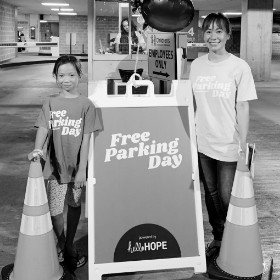Why Is My Child Sick? Finding Hope in the Tough Questions
Why me? Why my daughter? Why my son? These are immediate questions along any medical journey. I remember sitting at home one evening after one of Audra’s first endoscopies with tears in my eyes processing the day’s events with Mary Beth. The emotions in those moments seem amplified, and the added unknown of having to wait for the official test results didn’t help. I remember feeling a combination of anger and sadness toward the sickness that Audra was facing, and the question of why my little girl was in the cross-hairs of this disease was at the forefront.
Interested in reading more of our story?
Click here to learn about Audra’s story with EoE.
I had to deal with the question of why this was happening head-on, because I knew if ignored it could be incapacitating for my ability to lead my family and for my faith. The thing is, there are so many cliché responses that immediately went through my head and weren’t immediately comforting.
God is in control. Is he, really?
God has a plan. Does he?
God is good. How can this be true?
A Turning Point
As Mary Beth and I talked through the events of the day and how we were feeling, we tried to match up the picture of God that we had from the Bible with the events of the day and the everyday symptoms that Audra was dealing with.
Our experience with God over the years had been so profound, and we genuinely wanted to understand how the things we believed could still be true. Having a sick child just seemed so far from what we had known or expected. These moments, when I’m beyond what I think I can handle or could imagine, tend to take me back to the basics of the life of Jesus.
Jesus — the one who was supposed to fix everything and bring hope — lived a perfect, innocent life, and He faced torture, mocking, rejection, and a heinous death. How could God be good and allow this suffering? How could God have a plan when the rulers of the day took over and sentenced Jesus to death? How could God be in control with this chaos?
The pain and suffering — and even death — that Jesus faced cast a dark cloud over His friends.
But the story doesn’t end there. Three days later, the beauty of Jesus shines, and the chaos gives way to the unveiling of God’s purpose: to make a way for all of His hurting children to come to Him. The promise of hope looked different than what any of Jesus’s friends had expected, but oh, was it life-changing. Somehow, He used the pain and suffering to make forgiveness and grace available to anyone willing to stop thinking they had all the answers and trust that Jesus’s sacrifice was — and still is — enough to heal our hearts.
Can I be honest? Pain and suffering and sickness still cast a dark cloud today. That’s what I was feeling in the emotion of the day and the reality of physical symptoms of sickness. As I thought about the victory of Jesus over death, though, it gave me hope that the realities of my circumstance don’t have to define us or separate us from hope. Maybe God could have a plan for Audra.
Answering the Question
Experiences like this were turning points for me because Mary Beth and I took the space to ask candid questions and ask God to give us wisdom. Did we walk away with neat and tidy answers? No. Do I understand all of the pain and suffering in our world? No. But we did walk away from those conversations committed to each other and resolved in our faith.
In fact, many of the answers that didn’t seem comforting at the beginning seemed to be more helpful when I put them in the context of Jesus’s life.
Can God still be in control with the pain we experience? When I look at Jesus, yes.
Could God have a plan for this suffering? When I look at Jesus, yes.
Can God be good with suffering in the world? When I look at the grace He offers in Jesus, yes.
I think the reason that clichés can be so hard to swallow is the way they’re frequently delivered as a statement — even a well-intentioned statement — to fix how we’re feeling. What I’m learning is that God doesn’t want to us to try to fix each other like patching a leaky roof or replacing parts on a broken car: get it working and then be on our way. He wants us to sit together and listen to each other. He wants us to ask the candid questions and look into the Bible to see what He says about Himself. As we take the time to really listen in the cloudy seasons, God will meet us there.
As you go through medical adversity, each day can look different. If you’re looking for a resource to help you process the questions you have and give you some truths to consider and pray through, you may want to download a free copy of our prayer guide for families facing medical difficulty.













